News & Events in Belarus
Iranian roadmap, ‘snowdrops’, African affairs, nanometers, call to Putin in latest President’s Week
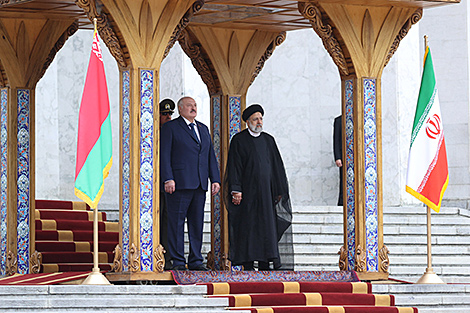
The work schedule of the Belarus president is always full of events. Aleksandr Lukashenko holds conferences and working meetings on the most topical matters concerning the country’s development, regularly visits the regions, goes on foreign trips and welcomes foreign guests, talks to reporters, signs decrees and laws. And even if there are no public events, it does not mean that the head of state does not work. It must be said that even when he relaxes, for instance, by playing ice hockey or chopping firewood, Aleksandr Lukashenko happens to find the time to give yet another instruction. All the decisions must be prompted by life, he likes to say.
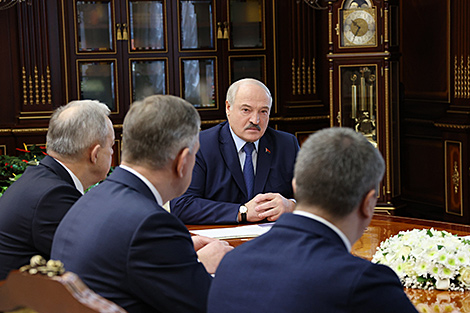
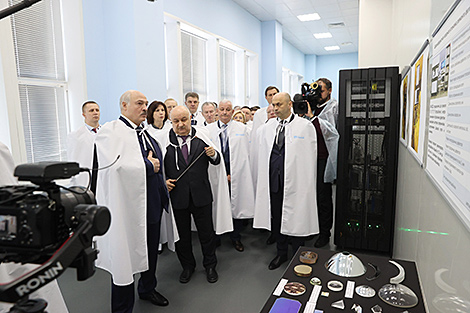
The President’s Week project is intended for those, who want to keep up with the head of state, be up-to-date on the latest statements and decisions of the Belarusian leader.
What did Aleksandr Lukashenko agree to in Iran and why can’t all these agreements be published? Who mistakes one’s own car for a state one? What do “snowdrops” have to do with saving state budget funds? Why will Zimbabwe’s first lady come to Belarus? How does cooperation with countries of the African continent continue on the whole? Greetings on Constitution Day, topics covered in a phone call between the Belarus president and his Russian counterpart, and a pivotal government conference on the development of the microelectronics industry are also in the new episode of BelTA’s YouTube project President’s Week.
BY GRACE OF GOD. How did Belarus-Iran friendship survive the test of time?
On 12-13 March Belarus President Aleksandr Lukashenko paid an official visit to Iran. In Tehran the Belarusian head of state had extensive negotiations with the leadership of the Islamic republic, which resulted in many agreements. Some of them were put on paper, including those marked “For official use” while other ones may well become the foundation for new joint projects. Aleksandr Lukashenko emphasized that the most important thing for Belarus and Iran right now is not to lose time. Tehran described the visit of the Belarusian leader as a turning point and a starting point for building deeper relations.
Aleksandr Lukashenko began the negotiation day in Tehran with a meeting with Iran President Ebrahim Raisi. The talks had been preceded by a solemn ceremony. At first the presidents discussed prospects of cooperation with few members of their delegations. Belarusian Minister of Foreign Affairs Sergei Aleinik, Industry Minister Aleksandr Rogozhnik, and Ambassador Extraordinary and Plenipotentiary of Belarus Dmitry Koltsov also took part in the negotiations on the Belarusian side. A little later they were joined by other members of the delegation.
As he welcomed Aleksandr Lukashenko, the Iranian president noted that Belarusian-Iranian relations have demonstrated a breakthrough over the past two years. Judging by the trade turnover, it is truly so. In 2021 Belarus-Iran trade totaled $33 million, a third up from 2020. The bilateral trade exceeded $100 million by late 2022, which represented a threefold increase.
“There is no doubt that your visit to Iran will give a serious great impetus to the development of our bilateral relations,” Ebrahim Raisi said.
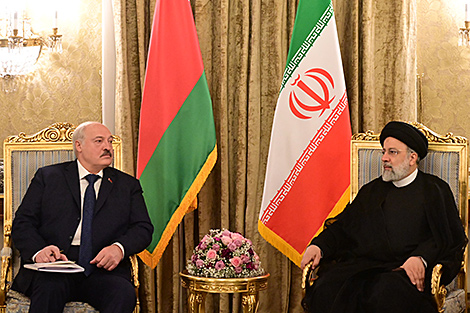
In turn, Aleksandr Lukashenko noted that the countries could have demonstrated even better results. “When I gave you a lot of credit for progress in bilateral relations, especially in the last two years, I did not do that just to flatter you. To be honest, our focus, and in particular, my focus on Iran somewhat weakened at some point. I often think about this and assume that we were meant to live through this period, a period of a less intense relationship. Yet, during this period we realized how much we needed each other, how closely we should cooperate in this world,” the president emphasized.
During negotiations involving more members of the delegations the Belarusian head of state thanked his Iranian counterpart for the hospitality and warm welcome extended to the Belarusian delegation. “An old Iranian proverb says: A friend is God’s blessing. I believe that I am visiting my friends. I am happy to pay another visit to Tehran, the capital of present-day Iran, the cradle of one of the most commercially and culturally advanced civilizations; trade routes had passed through its territory long before America was discovered,” Aleksandr Lukashenko noted.
“In modern terms, your ancestors knew about logistics, exports, transit much more than those who have been strangling your country with sanctions for more than forty years trying to impose the so-called democratic values. They apparently forgot that every nation has its own values that stem from their culture, way of life, upbringing, religion, and these values must be reckoned with. This is the guarantee of peaceful coexistence. Forgetting about this leads to wars,” the president stressed.
This is Aleksandr Lukashenko’s third visit to Iran. “During my every visit I see the tenacity with which your people resist external pressure and attempts to impose someone else’s will and I have a great respect for that and for your achievements in the field of advanced technology and nuclear energy. And, as we have agreed with the president of Iran today, we can be very useful to each other if we truly join our efforts,” the Belarusian leader said. “The ongoing visit will offer an opportunity to reach a new stage of our cooperation. And this cooperation will be highly efficient. I make such assumptions based on the agreements that we have already reached.”
Aleksandr Lukashenko described the 30th anniversary of Belarus-Iran diplomatic relations as a good occasion for taking cooperation to the next level.
FOR OFFICIAL USE. Why is the cooperation roadmap signed in Tehran not available to the public?
As a result of the talks in Tehran Aleksandr Lukashenko and Ebrahim Raisi signed a roadmap on comprehensive cooperation between Belarus and Iran for 2023-2026.
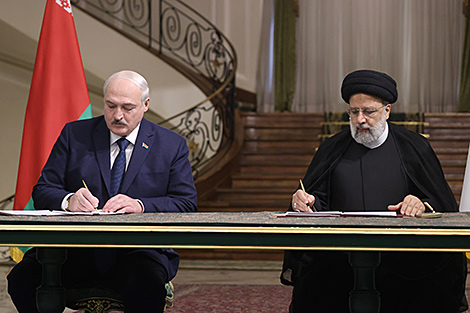
The document provides for the comprehensive development of cooperation between the two countries in political, economic, consular, scientific and technical affairs as well as in education, culture, art, media, and tourism. Given that both Belarus and Iran are under unprecedented pressure from the West (and the West will certainly not like the rapprochement of the two republics), the roadmap is marked “For official use only”.
A number of other documents on the development of cooperation in various spheres were also signed in the presence of the presidents.
The Belarus president described sanctions as a time of opportunities. Aleksandr Lukashenko stressed: “It is very important for us not to miss out on them. I can estimate the current visit at about $100 million if we implement all our agreements.”
“We have thoroughly examined the current status of our relations. And the president of Iran and I came to the conclusion that the relations experienced a little setback. However, the ongoing visit has helped to successfully restart the relations. We have agreed on a lot. This visit is remarkable for one more thing: for the first time we have reached agreements on all issues of bilateral cooperation and signed many treaties, agreements and memorandums of intent,” the Belarusian leader said.
Aleksandr Lukashenko noted that a big drawback in Belarus-Iran relations in the past was due to the fact that the parties had understood the situation correctly, had agreed on many things, but had not implemented everything. “Therefore, in the current conditions, it is of fundamental importance to cement our ties, expand contacts and implement all the agreements reached, without any delay or red tape,” the president stressed.
Cooperation between Belarus and Iran together with Russia in the development of the North-South international transport corridor will be an important area of focus. The Iranian side needs to build about 180km of railroad today. And Iran has actively embarked on this work to complete the North-South rail corridor in the direction of the port of Bandar Abbas. This is important for Belarus as well, including in terms of the possibility of transit through Iran to distant countries.
“I am sure that the roadmap signed today (a comprehensive plan of our cooperation between Belarus and Iran) as well as agreements and commercial contracts will help promote a long-term partnership,” the Belarus president said.
Speaking about sanctions, Aleksandr Lukashenko referred to Iran as an example and stated that no pressure had been able to stop the Iranian nation’s advance towards its independence and towards ensuring its own security. “I am pleased that we have similar positions and approaches to many issues on the international agenda. The main thing is that Belarus and Iran are committed to the idea of building a fair multipolar world,” the head of state said.
WORTH A LOT. What other meetings did Aleksandr Lukashenko have in Iran?
After the talks the presidents visited an exhibition of Iran’s leading medical manufacturers and R&D enterprises. During the visit Aleksandr Lukashenko noted that scientific and technical cooperation deserves special attention. The existing R&D products should become a good basis for deepening contacts and should be transformed into promising commercial projects.
Aleksandr Lukashenko shared his impressions of what he had seen during a meeting with Iran’s First Vice President Mohammad Mokhber, who is in charge of economic affairs in his capacity of the prime minister.
“I examined some samples, the things you manufacture. You amaze me. You create very high-tech equipment that the whole world needs. Take for example turbines, various information and communication things, and medicines. They are the most advanced, affordable. It’s worth a lot. We are ready to cooperate with you in all these areas. If you have an interest, let's set up joint ventures in Belarus and trade all over the world,” Aleksandr Lukashenko said.
In turn, Mohammad Mokhber stated he had no doubts that Belarus and Iran would accomplish all the agreements. He explained this by the fact that Aleksandr Lukashenko has a special grip. “I noticed that you are such a good executive director... You supervise work well,” he said.
During a meeting with the Belarusian head of state Chairman of the Islamic Consultative Assembly Mohammad Bagher Ghalibaf expressed confidence that Aleksandr Lukashenko’s visit to Tehran would be “a turning point, a strong boost” to bilateral relations. “What I was told about your today’s meetings suggests that your visit is very effective,” the speaker of the Iranian parliament emphasized. “I think that the regional and international conditions are rather well prepared for the development of comprehensive relations with your country. Without any doubt, further advancement of our bilateral relations depends only on us.”
Aleksandr Lukashenko noted the president of Iran plays a special role in enhancing cooperation between the countries. “All of it is happening thanks to the initiative of your president. It was he who kept pushing me and our officials to more active cooperation,” he said.
The rich negotiating day of the Belarusian president in Tehran ended with a meeting with Supreme Leader of Iran Ali Khamenei. The head of state had an opportunity to confidentially discuss all the agreements that had been reached and prospects of advancement of bilateral relations. It is worth noting that Ali Khamenei is very selective about his meetings and does not hold negotiations with every guest. “The countries that have fallen under U.S. sanctions should cooperate with each other and form a joint assembly to destroy the weapons of sanctions. We believe this is achievable,” Ali Khamenei said.
In his words, the potential of Belarus-Iran cooperation is way beyond the current level: “The level of relations should be significantly increased by using the spirit and the will that both sides have in order to implement the agreements”.
The 30th anniversary of Belarus-Iran diplomatic relations has already been mentioned. The countries celebrated this event after the end of Aleksandr Lukashenko’s visit, on 18 March. On this occasion the presidents exchanged congratulatory messages. “During this time a lot has been accomplished to better understand our capabilities, to deepen interstate relations in a wide range of areas. Tehran has become a reliable partner for Minsk despite various challenges and difficulties,” the Belarusian leader stressed. “Today’s situation requires coordinated and systematic efforts from us to maintain our economic positions and support the conditions for sustainable development”. These were the main topics during the talks held within the framework of the official visit of the Belarus president to Iran.
BASIC LAW. What did the president wish to fellow Belarusians on Constitution Day?
Constitution Day – 15 March – is one of the main state holidays. It is deeply symbolical that Belarus’ updated Constitution came into force on this day exactly a year ago. It is oriented towards the future and is truly a people’s Constitution because it was adopted by a referendum after a broad public discussion.
Traditionally on this day young citizens of Belarus receive their passports all over the country in a festive atmosphere. The president congratulated his fellow Belarusians on the occasion of the holiday.
“This day takes on special significance in the Year of Peace and Creation. The country’s basic law reflects the centuries-old desire of Belarusians to determine their own way of development, to live in an independent state, to ensure the welfare of the society by their own labor,” the greeting reads.
The head of state emphasized that the Constitution had been updated at a crucial time for the country and had preserved the fundamental principles of pacifism, social justice, respect for achievements of the past, continuity of traditional values of the Belarusian people, has become a reliable foundation for strengthening social unity, social and political stability, coordinated and effective work of all branches of power.
“In today’s geopolitical conditions, unwavering commitment to the provisions of the fundamental law serves as a powerful guarantee of protection of national interests, strengthening of the legal foundation of the Belarusian statehood, it makes us even stronger and more successful,” the president is convinced.
Aleksandr Lukashenko congratulated all the citizens of Belarus on Constitution Day! He wished Belarus to always be peaceful and prosperous.
BUDGET SAVINGS. Who should not confuse their car with a government car?
On 16 March the Belarus president held a government conference to discuss the saving of state budget funds. Head of the Belarus President Property Management Directorate Yuri Nazarov, Head of the Belarus President Administration Igor Sergeyenko, Chairman of the State Control Committee Vasily Gerasimov, Deputy Prime Minister Piotr Parkhomchik, Minsk Oblast Governor Aleksandr Turchin and Finance Minister Yuri Seliverstov took part in the meeting.
“The topic of today’s discussion is saving budget funds, and not only budget funds. Sometimes, when we try to save budgetary resources, we see cases of fake employment like it was in the Soviet Union. It means that people who formally hold manufacturing jobs, in reality work in state-funded organizations. Or we use vehicles of non-state-funded organizations to address issues that have to do with budgetary activities. Yet, no issues are addressed in fact. What happens in reality is that bosses use vehicles of state-run and private organizations for personal purposes. This is evidenced from the inputs that I have been receiving recently,” the president said.
Aleksandr Lukashenko reiterated that the focus of today’s discussion is saving. “Of course, first of all, this pertains to budget funds. They should be spent appropriately. This is people’s money. These funds are taxes paid by companies and individuals. These are public funds. And this money should be used for the needs of our people,” the head of state said.
IRON ORDER. What did Aleksandr Lukashenko talk about with the key man in charge of cooperation with Africa?
On 16 March the Belarus president also heard out a report from President’s Special Envoy Viktor Sheiman who oversees cooperation with African countries.
“Generals and top officials do not change after retirement. You will stay in charge of cooperation with Africa as the president’s special envoy,” the head of state told Viktor Sheiman.
Aleksandr Lukashenko wondered about progress in the implementation of joint projects in Africa, especially in the follow-up of the president’s recent visit to Zimbabwe. The possibilities of joint work were also discussed at meetings with the leaderships of the UAE, Russia and China. “I would like to know the following thing. After the visit to Zimbabwe, to the UAE, after negotiations with the Russians, we agreed with China on some joint projects in Africa, including in Zimbabwe. What is the status of these joint projects? We promised to help them improve their healthcare system, reduce maternal mortality and child mortality rates. We should really help them. This involves supplies of baby food. They will send a delegation here that will include the wife of the president [of Zimbabwe]. We will hold talks,” said the head of state.
He also asked about progress in the real sector of the economy, cooperation with other African countries. “After this visit, many people turned their attention to us. What is the overall situation in this regard, what are problems if any?” the president asked. “How accurate are these media reports alleging that we have problems with equipment supplies to the African market? I want you to sort things out there, to establish perfect order. Africans should have no doubts that we are conscientious and responsible people, we should not ask for more than it is necessary,” the president said.
PROPERLY MADE. Why does the president pay huge attention to microelectronics?
On 17 March Aleksandr Lukashenko visited the Minsk-based holding company Planar. Immediately upon arrival the head of state drew attention to the huge area occupied by the company in Minsk and asked the Planar management about plans to develop the production site. The president was told about the development strategy of enterprises that make part of the holding company, about import substitution and the relevant cooperation with the Russian Federation. A number of plans in this field have already been successfully implemented. In 2022 the company’s revenue amounted to about Br57.5 million, 21% up from 2021. The net profit was almost Br26.4 million (with the target set at Br12.2 million). The return on sales was almost 13%. In 2022 Planar’s export grew by 70%. The localization level at the holding company is 60-80%. “We have our own optical production, stone processing and precision mechanics, too,” Planar Director General Sergei Avakov explained.
The president toured the production facilities, where he was briefed on the holding company’s most popular products and promising R&D projects. A number of equipment units that were demonstrated to the president are the world’s best in their market segment. In addition to production, human resources were also discussed. The head of state asked whether there are enough qualified personnel and how the company approaches staff replenishment issues. Aleksandr Lukashenko convened a government conference at Planar’s premises in order to discuss prospects of development of the microelectronics industry.
A lot of attention is paid to the development of microelectronics in today’s world, including in the post-Soviet space. “The struggle to remain on the cutting-edge of this industry and the fight for microelectronics markets are among key reasons for military clashes. That is how important this industry is. And today I would like to discuss with you in detail the further strategy and tactics of development of the domestic microelectronics industry,” the Belarusian leader said. “Our meeting is taking place in a symbolic and historical venue. Planar was the birthplace of the Soviet microelectronics industry in the 1960s.”
The head of state shared an interesting story related to the Planar company. The famous native of Belarus, Nobel Prize laureate Zhores Alferov once recalled his conversation with the USSR Minister of Electronics Industry Vladislav Kolesnikov that took place in the 1980s. The latter said: “Today I woke up sweating, I had a nightmare that Planar ceased to exist, and there is no electronics industry in the USSR without this company.”
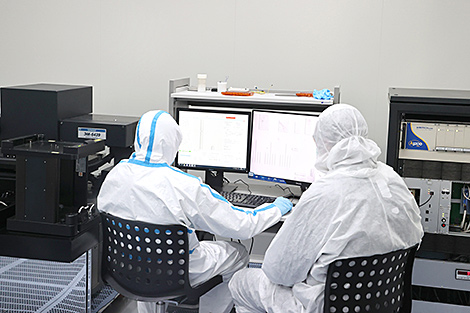
“That says it all. It was really the heart of the entire electronics industry. The key competencies in this industry were accumulated at the company. It was an absolute truth,” the president emphasized. “When this breakthrough industry was at its nascent stage, only America, the Soviet Union and Japan had sufficient intellectual and financial resources to keep it on its feet. Back then we also had related enterprises, in particular in Russia and the Baltic states, but its brain and its heart were in Belarus.”
Yet, during the heady days of perestroika and post-perestroika periods, only Belarus managed to preserve this legacy, which was not even national, but global legacy, Aleksandr Lukashenko emphasized. “I remember very well how they were pushing me to sell, to shut down these enterprises. They said they would buy, import everything from the West. Thank God, no matter how difficult it was, the country retained Planar, Integral, BelOMO, Horizont, and Vitebsk-based Monolith. Most importantly, we preserved the research infrastructure of this science-intensive industry. 30 years have passed. What do we see? In the struggle for the re-division of the world, technology plays a decisive role. The one who possesses it will not only survive, but will call the shots in the future. The so-called civilized, democratic Western world will not hesitate for a second to use technology as a leverage, to impose sanctions, to try to bring unwelcome states that compete with them to their knees,” the president noted.
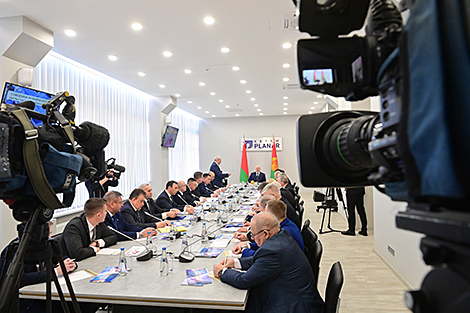
Yet, science does not stand still, scientists cooperate and collaborate. When it comes to microelectronics, you cannot just compete and isolate yourself within national borders, the head of state emphasized. “Belarusian manufacturers have retained their niche in the world market that has already set its eyes on nanoelectronics, not even microelectronics. As of today, several countries have already mastered the 4nm process. Our fairly large chips remain in demand. They are reliable. But, as I see it, we need to move away from large chips towards a smaller nanometer technology,” Aleksandr Lukashenko said.
Unique products are being created in Belarus in cooperation with the domestic civil and defense industries, Aleksandr Lukashenko noted. These are drones, robots, NC machines, fundamentally new types of weapons, world-class household appliances and much more. “Therefore, the field for work and further development is huge. Our primary focus is Russia. Our country has all the necessary competencies to meet the needs of the Russian market after the departure of Western enterprises. It's a chance for us. We must seize it. Rosatom, Roscosmos, Roselectronics... The volume of partnership agreements should grow,” the president said.
The head of state said that investors also show tremendous interest in Belarusian microelectronics. “My recent visit to Zimbabwe, the United Arab Emirates is a direct confirmation of this. They are ready to cooperate with us and want to invest in our industry, including microelectronics. Moreover, the amount of money is not an issue,” the head of state said. “Good financial investments are an opportunity to radically modernize the production base, develop new technologies and, as a result, increase exports.” Aleksandr Lukashenko noted that Belarus and Russia have compiled a list of electronic components of critical importance and Belarusian enterprises have already started shipping them.
In June 2022 Aleksandr Lukashenko already held a conference to discuss the development of the Belarusian microelectronics industry. The main areas of work were determined back then taking into account competences and capabilities of Belarusian manufacturers in conditions of sanctions-fuelled pressure. “I am told that some progress has already been secured,” the president noted.
Belarus and Russia have compiled a list of critical components, which will be manufactured by Belarusian enterprises and a roadmap on mastering their production has been worked out. “We’ve already started shipping a number of parts to Russian enterprises. An agreement has been signed on setting up a Belarusian-Russian joint center for the development and production of photolithographic masks. It will enable joint R&D work and will reduce the dependence of Belarusian and Russian consumers on imports,” the president said. The government has also approved a program to guide the development of Belarus’ microelectronics industry till 2030. The head of state said he wanted a report on how well-calculated and ambitious the prospects and the current approach to the future development of the industry are.
During the government conference Deputy Prime Minister Piotr Parkhomchik said that Belarus intends to more than triple earnings from selling microelectronic products by 2030. He noted: “Total sales from selling Belarusian microelectronic and electronic machine-building products will rise to $200 million in 2025. It will reach $330-350 million by 2030. It will be 3.3 times up from 2021. I’d like to stress that these are minimal targets.”
Aleksandr Lukashenko noted during the conference: “The key thing I am worried about is that scientists, product engineers, and people on the ground have to understand what needs to be done and where we should go. If we have people like that, then we will always find money for it. And we have people like that.”
UNION STATE TRACK. What did Aleksandr Lukashenko talk about with Putin at the end of the work week?
In the evening on 17 March Belarus President Aleksandr Lukashenko talked to President of Russia Vladimir Putin over the phone for about one hour. Among other things the conversation touched upon the matters the Belarusian head of state had been focused on during the past week.
The heads of state discussed prospects of construction of the North-South transport corridor, which will cross Russia, Azerbaijan, and Iran. Investments in the construction of the land-based transport corridor were discussed in detail. Vladimir Putin said Russia would be able to put together a pool of investors and invest in construction on its own. Belarus is interested in it since over 40 million tonnes of freight will be shipped along this corridor once it is built.
In continuation of the government conference hosted by the Belarus president on 17 March and a thorough discussion of microelectronics projects a number of matters concerning Belarus-Russia manufacturing cooperation in this field were raised. Taking into account this conversation the president discussed the issues that would be addressed soon. The governments of the two countries will have to make relevant decisions in order to step up interaction in this area.
The presidents talked at length about the creation of joint space satellites. All the competences of Belarus in this regard will be utilized by the Russian Federation.
Apart from that, Aleksandr Lukashenko and Vladimir Putin discussed in detail matters concerning joint work in the defense industry.
Thus, joint work in the sphere of import substitution was one of the main topics covered by the conversation.
The presidents also talked over other matters on the international agenda and discussed the agenda of the forthcoming session of the Supreme State Council of the Union State of Belarus and Russia.


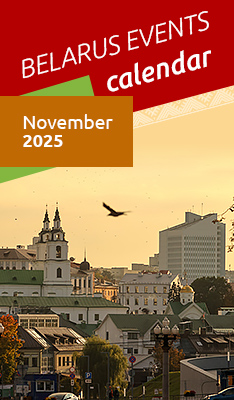




 print version
print version make home page
make home page add to bookmarks
add to bookmarks

